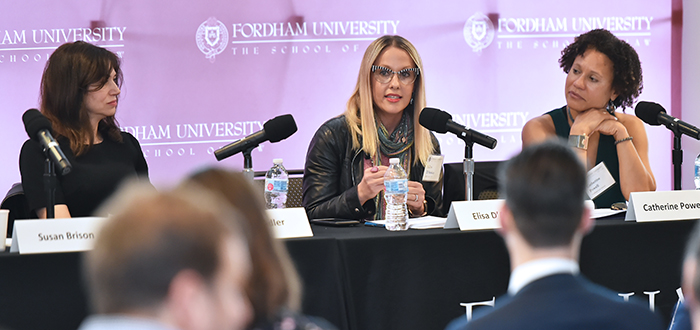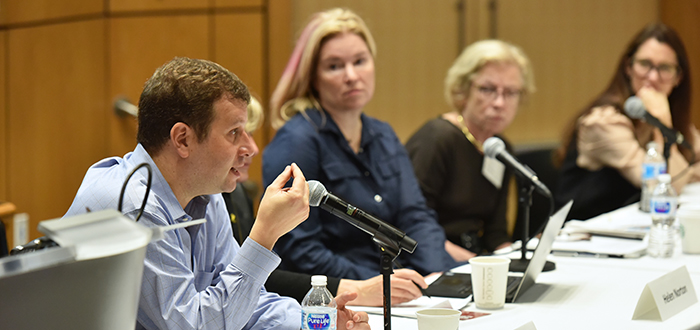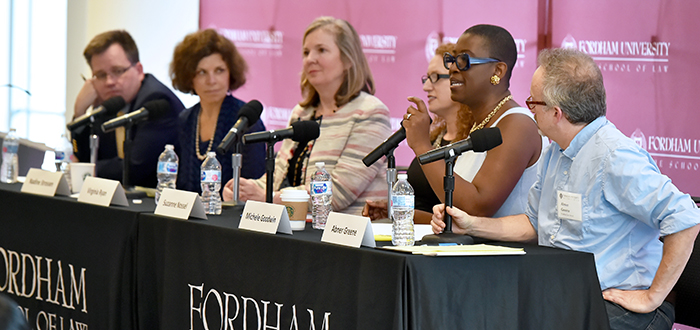When Elisa D’Amico ’06 meets with clients who have been the victims of revenge porn, the term used for the dissemination of sexually explicit photographs or videos of a person online without that person’s consent, the typical first request of the client does not at all surprise D’Amico, given how devastating these cyber-attacks are.
“The number one request of individuals who reach out to us is just get it down,” she said.

The repercussions of these attacks go far beyond embarrassment. D’Amico has worked with clients who have been unable to secure jobs or internships, displayed symptoms of PTSD and anxiety, and had to move in the aftermath of revenge porn incidents. Women are more likely to be the victims of revenge porn, and the perpetrator is most often an angry ex-boyfriend.
“The repercussions are not just internet-based,” D’Amico emphasized, during a panel discussion on pornography at the Fordham Law Review’s conference on Gender Equality and the First Amendment.
Is revenge porn—an indecent form of expression that disproportionally harms women—a protected form of speech? This and many other difficult questions involving equality and speech arose during the conference, which ran November 1 and 2 at Fordham Law.
The first panel addressed trigger warnings, safe spaces, and hostile classrooms on college campuses. It is impossible to look at free speech and censorship “without looking at underlying issues of vulnerability, diversity, and equality,” said Suzanne Nossel, CEO of PEN America.
While Nadine Strossen, former president of the ACLU, said, “I always advocated both feminism and free speech” and asserted that the two were “mutually reinforcing,” other panelists and audience members pushed back against this claim.
The second panel of the day, including D’Amico, looked further into the underlying issues of free speech, specifically drawing attention to the ways in which pornography exploits women, even when it is, legally speaking, consensual.

In a culture in which violence against women is normalized, acting as if freedom of speech practically applies to, and affects, every group in the same way is naïve and potentially harmful, argued Susan Brison, professor of philosophy at Dartmouth and Princeton.
Opening day two of the conference was a panel on power, media, women, and the First Amendment. Included among the panelists were alumna Susan Buckley ’77, and Corey Brettschneider, visiting professor at Fordham Law.
Brettschneider addressed President Trump’s Twitter habits, noting that “the duty to not tweet in this way is beyond obvious,” and adding that the ways in which Trump demeans women publicly may violate his duty to uphold the Equal Protection clause of the Fourteenth Amendment.

The next panel talked about the words and images associated with misogyny. Panelist Benjamin Zipursky, James H. Quinn ’49 Chair in Legal Ethics at Fordham Law, described two famous libel cases in order to tell the story of “degradation and defamation in a man’s world.” In one, a male jockey wins his rather dubious libel case, and in the other, a female pageant queen loses her case—even when the smears against her seem far more egregious than those against the jockey.
Danielle Citron ’94, visiting professor at Fordham Law, wrapped up the conference at the final panel, on “Being ‘Female’ Online.”
“We’ve been wrestling with the law’s limits,” Citron said. In order to combat serious affronts to personal dignity and autonomy wrongly characterized as free speech, Citron noted “we have to use all the tools in our toolbox—and pair them with hate crime laws.”


